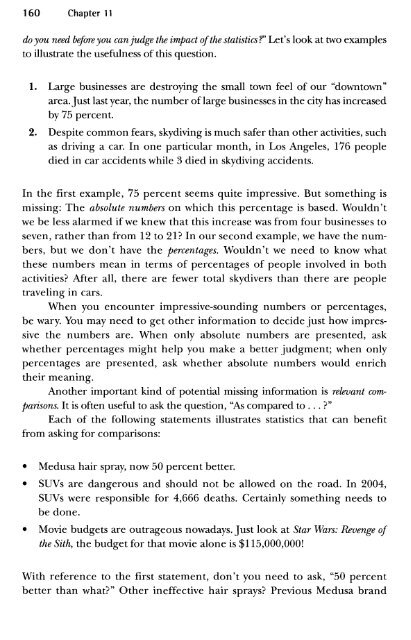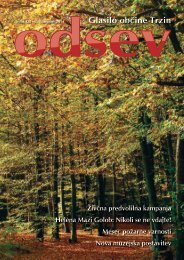Asking the Right Questions, A Guide to Critical Thinking, 8th Ed
Asking the Right Questions, A Guide to Critical Thinking, 8th Ed
Asking the Right Questions, A Guide to Critical Thinking, 8th Ed
You also want an ePaper? Increase the reach of your titles
YUMPU automatically turns print PDFs into web optimized ePapers that Google loves.
160 Chapter 11<br />
do you need before you can judge <strong>the</strong> impact of <strong>the</strong> statistics^ Let's look at two example<br />
<strong>to</strong> illustrate <strong>the</strong> usefulness of this question.<br />
1. Large businesses are destroying <strong>the</strong> small <strong>to</strong>wn feel of our "down<strong>to</strong>wn"<br />
area. Just last year, <strong>the</strong> number of large businesses in <strong>the</strong> city has increased<br />
by 75 percent.<br />
2. Despite common fears, skydiving is much safer than o<strong>the</strong>r activities, such<br />
as driving a car. In one particular month, in Los Angeles, 176 people<br />
died in car accidents while 3 died in skydiving accidents.<br />
In <strong>the</strong> first example, 75 percent seems quite impressive. But something is<br />
missing: The absolute numbers on which this percentage is based. Wouldn't<br />
we be less alarmed if we knew that this increase was from four businesses <strong>to</strong><br />
seven, ra<strong>the</strong>r than from 12 <strong>to</strong> 21? In our second example, we have <strong>the</strong> numbers,<br />
but we don't have <strong>the</strong> percentages. Wouldn't we need <strong>to</strong> know what<br />
<strong>the</strong>se numbers mean in terms of percentages of people involved in both<br />
activities? After all, <strong>the</strong>re are fewer <strong>to</strong>tal skydivers than <strong>the</strong>re are people<br />
traveling in cars.<br />
When you encounter impressive-sounding numbers or percentages,<br />
be wary. You may need <strong>to</strong> get o<strong>the</strong>r information <strong>to</strong> decide just how impressive<br />
<strong>the</strong> numbers are. When only absolute numbers are presented, ask<br />
whe<strong>the</strong>r percentages might help you make a better judgment; when only<br />
percentages are presented, ask whe<strong>the</strong>r absolute numbers would enrich<br />
<strong>the</strong>ir meaning.<br />
Ano<strong>the</strong>r important kind of potential missing information is relevant comparisons.<br />
It is often useful <strong>to</strong> ask <strong>the</strong> question, "As compared <strong>to</strong> ... ?"<br />
Each of <strong>the</strong> following statements illustrates statistics that can benefit<br />
from asking for comparisons:<br />
• Medusa hair spray, now 50 percent better.<br />
• SUVs are dangerous and should not be allowed on <strong>the</strong> road. In 2004,<br />
SUVs were responsible for 4,666 deaths. Certainly something needs <strong>to</strong><br />
be done.<br />
• Movie budgets are outrageous nowadays. Just look at Star Wars: Revenge of<br />
<strong>the</strong> Sith, <strong>the</strong> budget for that movie alone is $115,000,000!<br />
With reference <strong>to</strong> <strong>the</strong> first statement, don't you need <strong>to</strong> ask, "50 percent<br />
better than what?" O<strong>the</strong>r ineffective hair sprays? Previous Medusa brand



